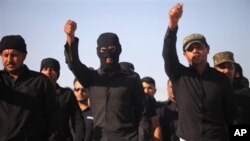Despite U.S. and European efforts to track some 3,000 Western nationals fighting alongside terrorist organizations, analysts warn that Arab nationals joining Islamic State and Jabhat al-Nusra in Iraq and Syria, and al-Qaida in the Islamic Maghreb (AQIM), pose a far greater threat to Mideast stability.
Lacking the strong intelligence-monitoring capabilities available in the West, countries such as Libya, Tunisia and Yemen have little accurate information on how many of their own nationals are returning from extremist battlefields. Yet their potential is incredibly destabilizing, says Jeremy Shapiro of the Washington-based Brookings Institution.
"It is a much bigger threat than the threat to the West," he said, explaining that unlike the limited numbers of foreign fighters trying to create havoc in Europe, Arab foreign fighters are more numerous and more dangerous. "Just in terms of sheer numbers: there's 10 times as many foreign fighters from the Arab world as there are from the West, and these countries are politically unstable [and], in many cases, less capable of dealing with them.
"This is not a question, as it is in the West, of just sort of finding a few individuals and disrupting a terrorist attack," he added. "This is a problem of people with a lot of experience in violence with a very strong political ideology being injected in large numbers into very vulnerable societies."
According to Clint Watts, senior fellow at the Philadelphia-based Foreign Policy Research Institute, many returning Arab fighters drift to safe havens in eastern Libya, which has been in a state of mild chaos since the fall of late dictator Moammar Gadhafi. Citing growing concerns about Libya becoming a sanctuary from which Islamic State and AQIM militants could conduct attacks regionally, Watts says three other locations face significant risks.
"The second one will probably be Lebanon, which has got a significant number of foreign fighters stretching through it as well as fighting that is spurred or inspired by the Islamic State, and/or Jabhat al Nusra, or Hezbollah," he said. "Then I think the third one is Jordan, who's got a heavy refugee issue that is also combined with having lots of foreign fighters go there, and a fourth will probably be Turkey."
While Ankara recently curbed the flow of foreign fighters entering Syria, Watts says many remain in Turkey, including militants who are unable to return to their home countries.
The Arab fighters who arrive in the thousands from Tunisia, Yemen, Jordan and Morocco, he says, are more likely to lend their experience to local insurgencies for longer term political gain.
"They seek political power — [that] is ultimately what they are trying to do in their local environments in North Africa and the Middle East, and they are doing that through the initiation of an Islamic state," he said. "That's what their goal is when they return home, as opposed to the Europeans, [who] are more just committing violence on behalf of an ideological cause."
Islamic State group sympathizers also are beginning to stake out a presence in Afghanistan, potentially widening the arc of violent destabilization, analysts say.
Watts says despite the swift Western response to the recent attacks in France, so far there has been little willingness on the part of Western nations to step into nations like Libya, despite the presence of al-Qaida, Islamic State and hundreds, if not thousands, of foreign fighters.








